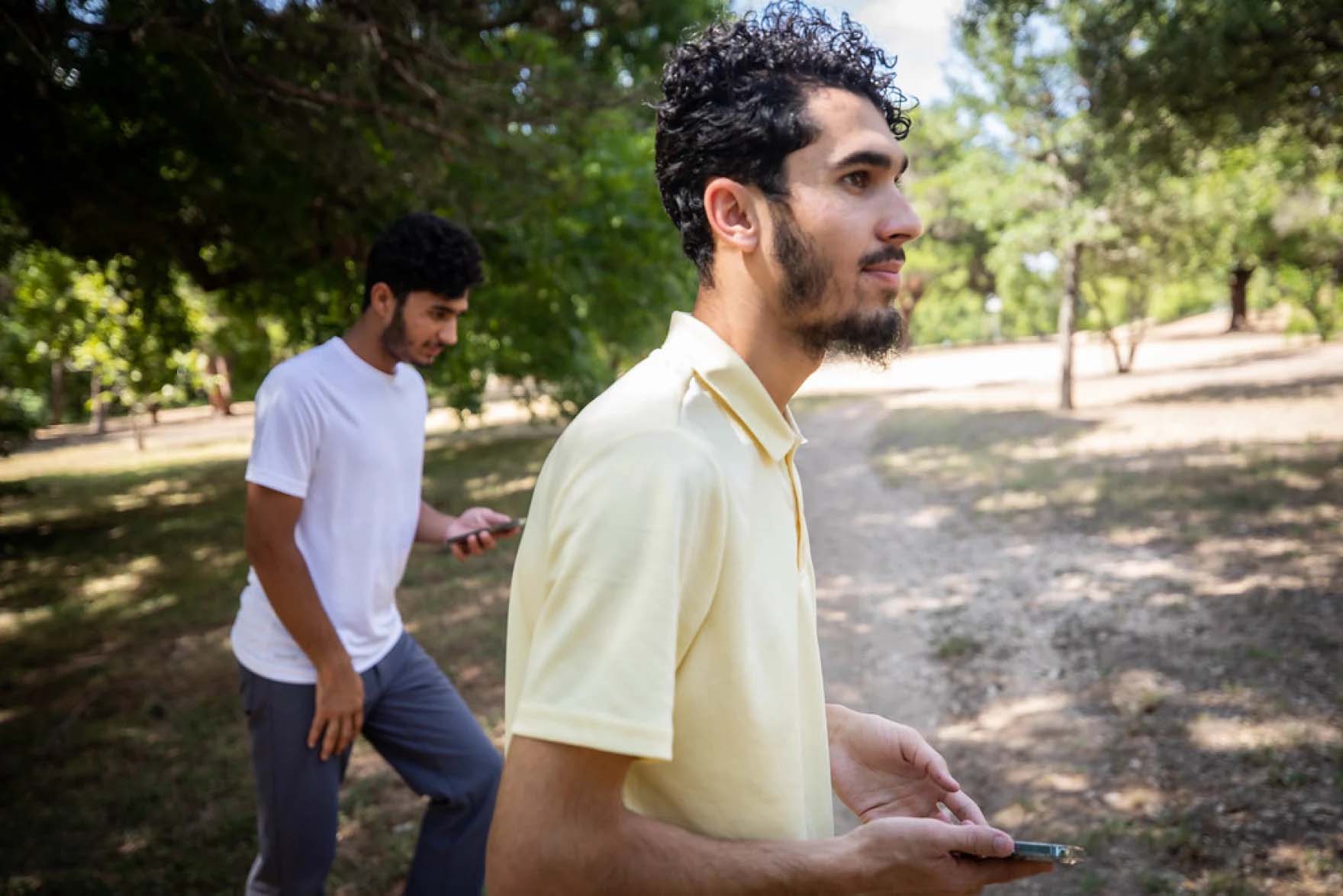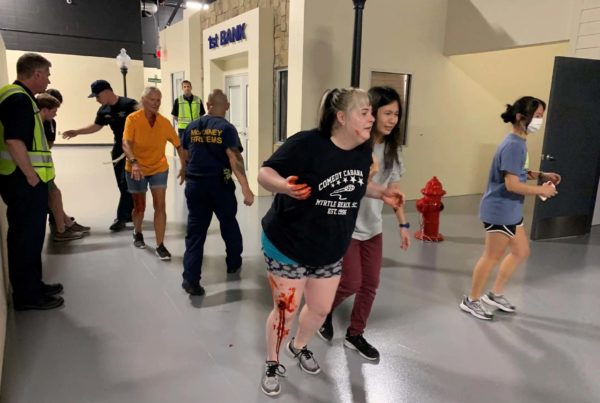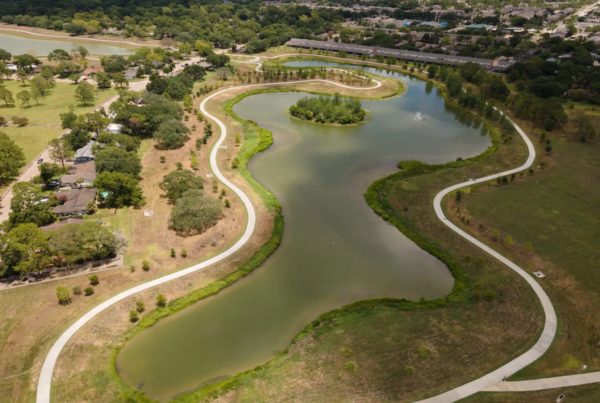From KUT:
Twenty-year-old Matiullah Noori huddles next to his brother and father on pastel patterned floor cushions. They’re on FaceTime with Matiullah’s uncle and baby cousin. Speaking Pashto into the phone, they raise their voices, trying to be heard from thousands of miles away.
The Noori family fled their 14-bedroom home in Afghanistan after the Taliban retook control in August 2021. Matiullah and his 29 relatives were among the 2,659 Afghan evacuees brought to Texas by Refugee Services of Texas, the largest resettlement agency in the state.
The agency provides local organizations money to help with refugee expenses. However, the program is limited to a refugee’s first three months after arriving in Texas.
Anjum Malik, the executive director of Global Impact Initiative, says that three-month period goes by quickly. Afterwards, families are on their own and have to rely on nonprofits like Malik’s to make ends meet.
Now, on the anniversary of the Taliban takeover, Afghan families are still living in isolated communities in Texas and struggling to navigate life here.
Housing is the biggest issue the community faces, says Malik, and she saw it firsthand helping the Noori family.
“Imagine, you’ve come here as a refugee. You have no community ties, you have no nest egg and you don’t have a stable job or any income history,” she says. “How is a landlord supposed to rent to you?”
The Noori family lives in a South Austin apartment complex that houses over 50 Afghan families. Matiullah says it was hard adjusting to the new space, but they made it work. Every night, cousins flow in and out of the four units they now call home. People fall asleep in whichever room is closest.
Matiullah’s shared bedroom doubles as a communal space with three long floor cushions that line the perimeter of the room, similar to their living room layout. Layered decorative carpets trail from the front door to the balcony; even the bathroom floor is covered in a patchwork of rugs.
On a Saturday morning in July, people mill about in the kitchen, making tea and preparing lunch or dinner hours in advance.
For months, Matiullah worked as a grocery store cashier and was the only one of his 30 family members in Austin bringing home a consistent paycheck. In addition to paying his family’s expenses, he often sends money to his remaining 33 relatives in Afghanistan.
He worked full time while taking English classes remotely through Austin Community College and, as the only one with a driver’s license, took family members wherever they needed to go in their donated car.
Matiullah recently quit the grocery job. He says he’s found something more flexible and works night shifts so he can drive his siblings to school, take remote ACC classes and tend to family matters.
He says he plans to squeeze in a few hours of sleep between errands and work.
“I have to use coffee a lot,” he says. “It doesn’t matter what’s in the coffee. [If I’m] awake, it’s my favorite.”
Things were difficult when the Noori family first arrived in Austin, Matiullah says. His family would call him at work every day, asking him to translate documents and emails for them. Often, he’d get forwarded phone calls from government agencies, leasing offices and local nonprofits. He started planning work shifts around his family’s appointments with doctors, dentists and pediatricians.
“They need[ed] me to be at home all the time. At first it was very hard, but now they have a lot of information,” he says. “They [are] all getting better every day. My brothers go to school, [they are] learning to speak English. They can translate for each other.”
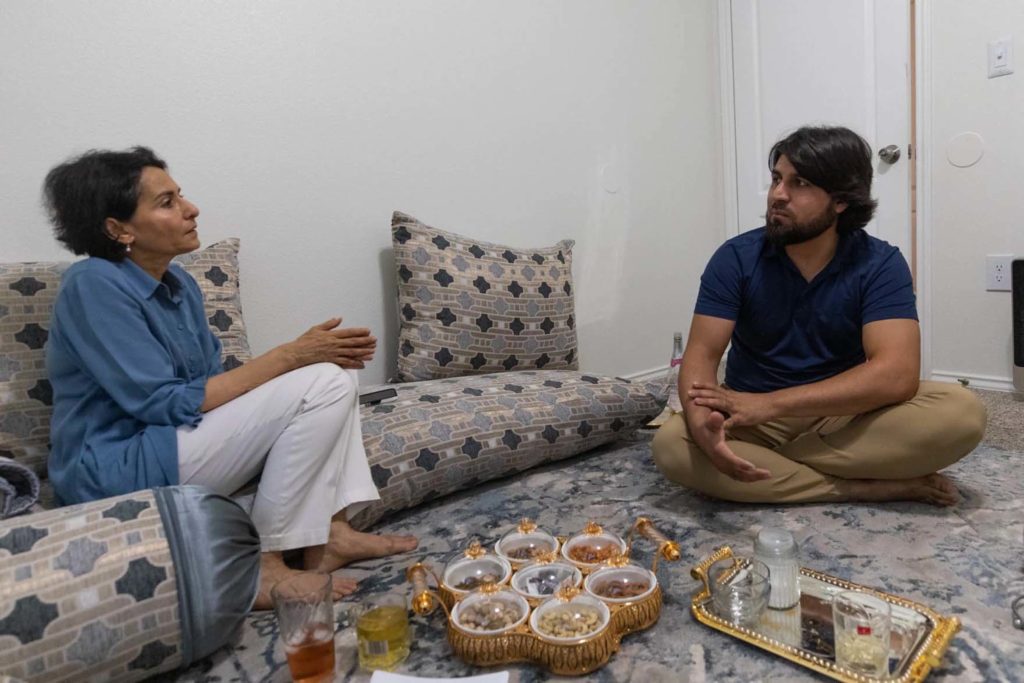
Anjum Malik, executive director of Global Impact Initiative, speaks with Kareemullah Ghazi in Ghazi’s apartment last month. Ghazi fled Afghanistan with his wife and children when the Taliban took over the country.
Malik says learning English is a barrier many have yet to overcome. Local organizations must walk refugees through government processes and provide English classes. Malik says the ones who get left behind the most are Afghan women.
“They have never held a job or any formal role outside of the home. Most of these women have not stepped outside their rural village. They have so much apprehension and anxiety and fear about their new life,” she says. “They cannot communicate with anybody. They cannot play a role in their children’s schooling. It’s very, very difficult. Who do you go to for support for basic things like operating the microwave or operating the oven?”
Matiullah says his three uncles are illiterate in their native language, and his parents have struggled to learn English. The younger kids have a better handle on the language thanks to school.
Matiullah’s family is slowly getting the hang of things, but that isn’t the case for many Afghan families living in his apartment complex.
As one of the few English-speakers around, Matiullah says he feels like the community translator and that it’s his duty to help others. But he says tasks like enrolling children in school are a challenge when families sometimes have up to nine kids.
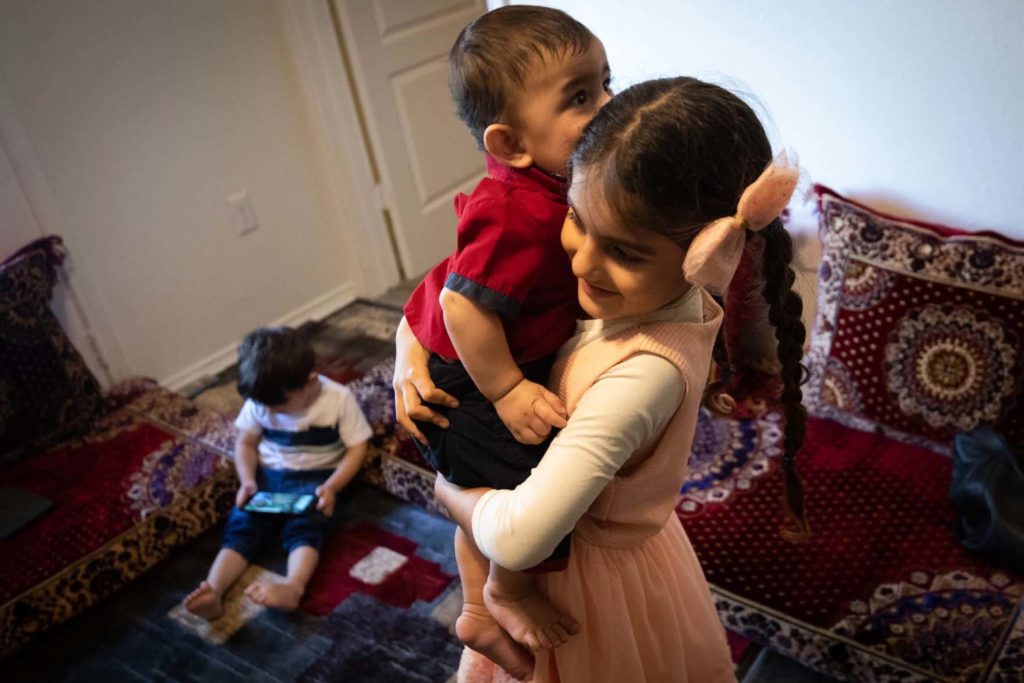
Medina, 5, holds her youngest brother, Omair. Tasks like enrolling children in school can be a challenge for Afghan refugees.
“We have a lot of children to enroll in school, fill out the paperwork for them, to do everything,” he says. “There is a lot of papers just for one.”
When he steps out of his apartment to soak in some sun and breathe fresh air, he almost always gets flagged down by a neighbor.
“It’s very hard to be all the time at home,” Matiullah says. “When my neighbor sees me, [they say,] ‘Oh, you’re free!’”
And rather than telling them he has to work, he helps however he can.
He says he’s doing work he believes should be taken care of by Refugee Services of Texas, but the agency doesn’t have enough resources for every family.
In late July, Matiullah hadn’t heard from them in months. “There’s like three case workers taking care of us, [but] nobody doing things for us,” he says.
With little guidance, Matiullah says, he applied for his green card on his own in hopes of receiving financial aid for college classes. In Afghanistan, he was on track to begin his second year studying construction engineering at Kabul Polytechnic University. But then the Taliban took the capital.
“I had a hope to come [to the U.S.] and finish my education,” he says. “I know a lot of people [in Afghanistan], they stopped their education because of insecurity and they are scared.”
Matiullah says he’s happy to be continuing his education in Austin and hopes to study engineering at UT. Earlier this summer, there was an explosion near his former university. His classmates had to set aside their studies and stay home out of fear.


